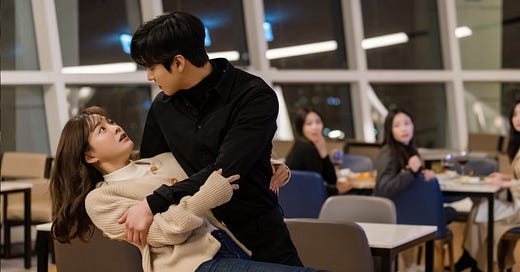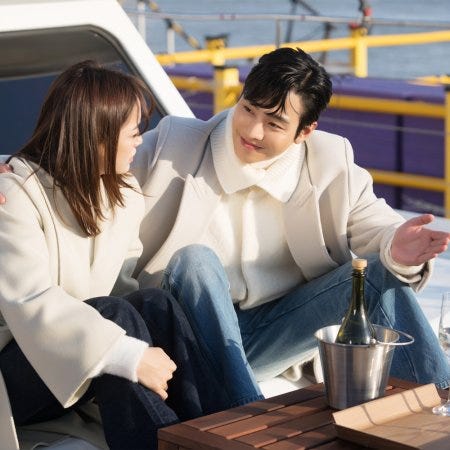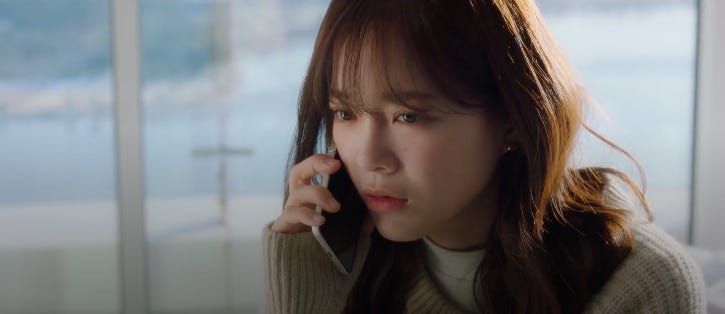“Is this a kissing book?” This is the question posed by the grandson to his Peter Falk grandfather in The Princess Bride. It’s a question I pose in all unseriousness here. A Business Proposal is unequivocally a kissing book. Unless it’s a fuddy duddy historical drama, it’s more or less expected that two people at the centre of the narrative who have strong feelings for each other will lock lips to seal the deal as it were. However, in a kissing book, a kiss also acts to complicate matters particularly if it is expressed in an untimely fashion as seen in Episode 7.
It occurred to me while watching the most recent episodes, Episodes 7 and 8, how difficult it is for writers and directors of romantic comedies to get the matter of push and pull right. First of all it’s difficult to find a genuinely good reason to keep two people apart once it’s been established that they like each other. Especially in the 21st century. All the “old” reasons feels hollow in a contemporary setting. So much unnecessary effort it seems to me is spent trying to keep couples apart in these modern rom coms. Unnecessary on hindsight because when both sides finally stop playing the noble idiot or whatever melodramatic trope gets thrown in, the implication is that their bond is much stronger than existing socio-cultural norms (so we’re told). Rather than actual threats those barriers to entry to my mind are ultimately just tests to see if these two people have what it takes to keep it together.
Ha-ri might have kissed the president of the company in a moment of weakness but she has her qualms about the discrepancy of status between them. Or so she says. If the show is to be believed, she soon changes her mind about the importance of social mores when she realises that she in fact likes Kang Tae-mu much more than society’s approval. The thought of him having dinner with another woman even in a neutral context is icky — which is why she works so absurdly hard, pushing through sprain pain to win the MVP award during the dodgeball competition. We are to conclude then that she in fact is really in love with him and that a small thing like what “other people think” is far more irrelevant than she had thought. The entire scenario lends itself to two equally valid interpretations. 1. Judging from the rapid speed in which she changes her mind, Ha-ri never really cared about what other people thought in the first instance. She was just nervous about getting involved with her boss and it was an excuse of sorts with a kernel of truth so she played hard to get as a result. 2. Although Ha-ri told Young-seo that it’s not good to tell a man to pretend that a moment of intimacy never happened, she did it anyway. Why? Because it is easier to give out good advice than to live by them. Despite Tae-mu’s earnest confession, and his enthusiastic response to her peck on his lips, she doesn’t believe that feelings are enough to make it worth his or her while. “It won’t work out” seems to be the mantra here which is echoed by Min-woo. It’s not that she thinks he is insincere or even that others will gossip disapprovingly. She’s in effect afraid of failure even before there’s a concerted attempt to try and make it work… based on presumably last century assumptions about only marrying someone of your own social strata.
Tae-mu to his credit understands this perfectly. It’s not that she finds him revolting. On the contrary, she has an unholy attraction to his lips and she secretly finds him impressive. Unfortunately she can’t get past the difference in their social status so he plays the transactional game with her which admittedly for him is like smelling all the food in a restaurant without taking a single bite. It offers certain pleasures but ultimately unsatisfying. It is easy for the audience to sense his frustration because he has done every single thing that’s humanly possible to show that it’s no flash in the pan with him. His growth is palpable. She’s the one dragging her feet but then for her it’s not about him as a man but as two people part of a wider society not playing by unwritten rules policed by other people.
The other guy Min-woo is ready to offer his objections at the first opportunity. It’s clear that he has all kinds of feelings for Ha-ri that trump even those he has for his own girlfriend, Yoo-ra, who has an inkling or two. For years he left Ha-ri waiting in the wings while he was on the treadmill of an on-again, off-again relationship with Yoo-ra. Even if he thinks he is of the same social status as Ha-ri which is supposed to enhance his suitability as a life partner for her, his character is far too wishy washy by comparison. Which woman does he want? He can’t have a bet each way because no woman in this era with some measure of self-respect would tolerate it. It is clear that he can’t properly keep one woman happy when he’s full of thoughts of another. Therefore he is positioned as a contrast to Tae-mu in that regard. During their trip out to sea, Tae-mu was entirely focused on the woman he was devoted to. He looked at her lovingly, he talked about her, why he liked her, he showed that he knew what her interests were and he apologized for not being attentive enough. Min-woo who was accompanied by his girlfriend was overly preoccupied about Ha-ri in a dating relationship with the president of her company which is a cover for him who fears losing Ha-ri. It has suited him, undoubtedly to have his own love triangle which he’s been in control of the whole time rather than to be in another love triangle where he has been relegated to the role of bystander.
So expressive individual liberty wins its day in this court of appeal against conventional wisdom. This is what the kissing part points to in their narrative . However, there are those of a different generation who have enough wealth that marriage is less about intimacy and companionship than it is about building strategic alliances to maintain that wealth. Grandpa of late has been in that sort of mood even after being teased by his closest drinking buddies for being an overbearing grandfather. He’s now got the notion of setting Tae-mu up with the screechy code-switching cousin of Young-seo. At heart, he’s still a technocrat trying to direct the family empire because his highly intelligent, multi-talented grandson just can’t be trusted to… erm… actually make the right call for his future.
So all parents and parental figures are instinctive well-meaning busybodies. Until the well-meaning part becomes the barrier to happiness. Then they may, depending on the writer’s whim, turn into villains. In their own minds, they are being heroic. Saviours more precisely… of their children, their family legacy etc etc. So what’s up for grabs isn’t necessarily competing agendas but competing narratives about marriage and its relationship to happiness. Is marriage fundamentally about personal happiness? Or is it about primarily furthering familial/community interests? That said, are these two agendas diametrically opposed or is there room for negotiation? A lot of this boils down to how happiness is defined and how accurate a marker it is of success.
Anyone in any long term relationship knows that negotiation and accommodation are key features in its success. That suggests in no uncertain terms that happiness has to be strategic and achieved on some level. Happiness doesn’t just happen or fall down from the sky, even if the opportunities do feel that way. Despite what sometimes seem to be said, feelings are not the primary driver but the result of observations and actions. Tae-mu who is no stranger to hard work or thinking strategically knows this. He leaves nothing to chance if there’s even the slightest possibility that he can get the girl. He is on a hero’s journey to jump through hoops, fend off attacks, face his own fears and slay the monster. The young heir to his family’s fortune already knows some measure of success in work but he now has to apply all of his existing life skills to a new endeavour: wooing the woman that he likes. His exploits are humorously chronicled in these two episodes but there’s a serious, a much more practical side to it. It is why contract relationships are an unerring source of pleasure because the discerning audience knows deep down that true love can come to strangers who have committed themselves to the process of negotiation and accommodation. The much decried piece of paper is not only proof of a lifelong commitment but it signals the start of an era of, to put it in more clinical terms, collaboration and cooperation that leads to genuine affection.
Even though it seems to be that Tae-mu is only play acting to Ha-ri but the audience knows he isn’t. He is playing out his fantasy of being Ha-ri’s boyfriend — which is a fascinating reversal. He is a prince in search of Cinderella and in his case because he was awful to her not that long ago, he has to prove his mettle, to wear down her defences, so to speak.
In one of my favourite contract marriage shows of all time, the original Taiwanese version of Fated to Love You, the male lead’s former girlfriend, Anna, who was a no-show on the what was supposed to be the most important day in his life, expresses her disbelief that in a short period of time her “rival” has managed to unseat her from the throne of his affections. That oddly enough, the brief months that Cunxi and Xinyi spent together can completely diminish what Anna and Cunxi shared over years. The first thing to note is that time as a factor in the success of a long-term relationship is not all it’s cracked up to be. What truly matters is that Xinyi offered Cunxi something he was longing for (consciously or unconsciously) from the start and that is the prospect of building his own family. It was never his intention to have a long dragged out romance with the woman he loved but he wanted to start a family with her for a long time. That opportunity came but not with Anna and it turned his life completely upside down.
To Tae-mu’s credit, and because he does live up to his reputation of being highly intelligent, so he cottons on fast. He saw Shin Geum-hui (Ha-ri’s alter ego) and liked her straight away. He liked her frankness and the fact that she wasn’t all that interested in flattering him. For a no-nonsense guy who really wasn’t interested in dating, that’s a breath of fresh air. So the two of them go out on dates to maintain the facade in front of Grandpa, and Tae-mu quickly realises that he’s found his ideal woman which he had never thought that much about. But he also always appreciated Ha-ri’s professionalism at work although it doesn’t twig at first that it’s one and the same person.
At the start of Episode 8, after locking lips in the office showroom, Ha-ri suffers a bad case of cold feet/buyer’s remorse and takes off. Of course there’s no way Tae-mu is letting her off the hook and demands that she take responsibility so they go on a series of fake dates that only reinforces to Ha-ri that she can actually enjoys being liked by Tae-mu. It isn’t his wealth that she’s dazzled by. That’s the part that makes her embarrass and nervous. It is his persistence and diligence that really wins the day. Tae-mu isn’t just the scion of a large conglomerate, he is genuinely good at everything and a capable businessman. In a previous episode he thought that being rich and handsome would be enough but he soon understands that to gain Ha-ri’s love, he needs to actually try much harder because his wealth might be more of a hindrance than a help.
I have little doubt that one of the reasons why Ha-ri is responding to Tae-mu’s bombastic overtures despite the nuttiness is because he is not Min-woo. This is a man who likes her and isn’t backwards in coming forwards. Min-woo might be nice to her and offer friendship but it has been rather like going to his restaurant, getting the entree, and then leaving 15 minutes later feeling somewhat hungry. What Ha-ri wants, whether she knew it or not, is to be wanted… to be loved passionately… and to be kissed.







Wow.. you actually did squeeze out interesting content from this drama, and I’m not surprised. For me, at first this show was a no-no. But it strangely grew on me, maybe because I’ve been super tired from work lately and I get to enjoy a little no-brainer every Monday Tuesday. I’ve never actually focused on the how’s and why’s of this drama, I was content with the over the top visuals, honestly. I was simply satisfied because even though this has got a cliché story line, supporting characters built in order to get the main leads together, it still is a drama which runs at a fair pace, no unnecessary dragging, no useless flashbacks (something I’ve personally always disliked).
But your observation here is impressive and showed me another angle of the show which, I’m now coming to realise, is in fact, logical.
Your last observation - "What Ha-ri wants, whether she knew it or not, is to be wanted… to be loved passionately… and to be kissed." - really moved me. I was quite annoyed by Min-woo's appearance in the show because he just enjoys having Ha-ri nearby. But Ha-ri is meant to be deeply loved and cared, and Tae-mu is here for that!